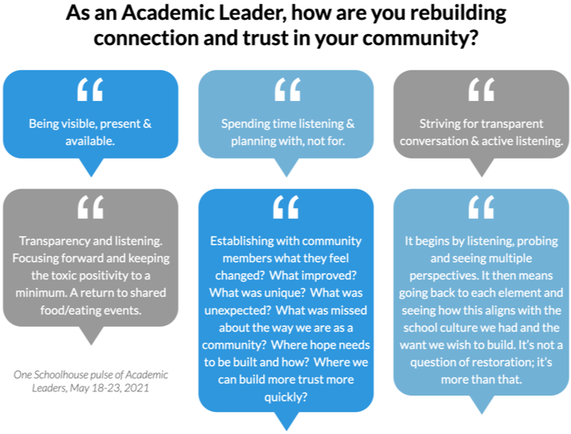 Sarah Hanawald Sarah Hanawald As vaccine distribution expands to teens and many restrictions are lifted in the U.S., educators and families are starting to feel hopeful going into the summer and are looking towards the fall with optimism that school will be more “normal.” The promise of an end to the health pandemic is in sight….but it’s not “over” yet. Furthermore, school leaders must continue to engage in equity work to oppose racial injustice. Exhortations to avoid “toxic positivity” have been flooding into my inbox lately in the newsletters I get from various organizations. These articles typically remind the reader to acknowledge that many members of our community are not looking for silver linings but instead are struggling with grief, disillusionment, or other stressors they carry for themselves and others. Some of those losses have been shared. Many have not. This reminder is a timely challenge because often, independent school leaders instinctively reach for appreciative inquiry, asking ourselves “what positives can we identify?” Further, in our school lives, we spend a lot of time helping those around us develop confidence and a growth mindset. Our growth mindsets mean that we encourage students to say “not yet” instead of “I can’t” when they face a setback. This is, in fact, one of our superpowers! Although a growth mindset may be critical for long-term growth, this is not the moment for a “relentlessly cheerful” approach to our work with families, students, or colleagues. The next few months are a time for leaders to demonstrate their empathic awareness by acknowledging the burdens of the past year instead of rushing past them. Authentic resilience emerges not from the moment of crisis, but from the process of moving through the aftermath of the crisis into reconstruction. What’s most essential to that resilience is, unsurprisingly, our connections to one another. Researchers Rob Cross, Karen Dillon, and Danna Greenberg studied the importance of professional networks in building resilience in their members. They write that good leaders build resilience by “shifting perspective and reminding [others that they] are not alone in the fight.” Leaders who say, “This is tough,” or “I can’t fix this for you, but I’ll help you get through it,” have more impact than those who try to minimize difficulties. The researchers identified eight things effective networks provide to their members:
Of course, not all of these factors apply in every situation. Academic leaders who are thoughtful listeners and highly empathetic will consider not just who on their team needs what kind of support, but how best to provide that support and ensure that the timing support is right. One final note, of utmost importance for academic leaders in the coming months is self-awareness too. Leaders should be considering not only the role they play as members of these networks for others, but how to tap into their personal networks for building their own resilience too. Association for Academic Leaders members can sign up for our online course, Supporting Faculty Wellbeing Right Now, April 25 - May 1, 2022, and May 2 - May 8, 2022.
Objectives:
0 Comments
Leave a Reply. |
Don't miss our weekly blog posts by joining our newsletter mailing list below:AuthorsBrad Rathgeber (he/him/his) Archives
July 2024
Categories |


 RSS Feed
RSS Feed